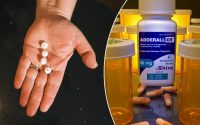Holiday hangover remedies that experts recommend — and some they don’t
From spiked eggnog to warm mulled wine, holiday excess can leave you in a hungover haze for days.
It’s not just the holiday season, of course: Americans are now drinking at record high levels, with childless women over 35 leading the bar crawl.
That means more people are likely to spend their days struggling to get over a horrendous hangover.
While some studies claim to support the potential health benefits of light to moderate alcohol consumption, several others have found that any amount of alcohol could increase the risk of developing health complications such as cancer, liver disease, and diabetes that can lead to an early death — and its harmful effects on the body can be felt after just one night of over-consumption.
“A hangover is a clinical condition that is characterized by a combination of effects from alcohol metabolism and dehydration,” Dr. Johnny Parvani, REVIV founder & chief medical officer, told The Post.
Shutterstock
Alcohol can cause dehydration, poor sleep, headaches, heart pounding, stomach issues, nausea and vomiting, as well as inflammation in the liver, pancreas, brain, gastrointestinal tract and other organs as the body struggles to flush out the toxins and recover nutrients.
The effects of alcohol impact everyone differently, but people often report fatigue, weakness, thirst, headache, muscle aches, nausea, stomach pain, vertigo, sensitivity to light and sound, anxiety, irritability, sweating and increased blood pressure.
While there are no certified hangover cures, here’s some clarification on popular recovery methods to offer relief for those who overindulged in their imbibing.
IV treatments
Intravenous (IV) drip treatments have risen in popularity in the last decade with IV bars opening around the country and IV companies making house calls, setting up shop inside luxury apartment buildings and being favored by celebs like Chrissy Teigen, Lorde and Miley Cyrus.
The restorative infusions release cocktails of vitamins, minerals, electrolytes and antioxidants such as selenium, vitamin C and B-complex directly into patients’ veins for an almost immediate boost.
Parvani, an emergency medicine specialist, claimed that IV drips “are the most effective way to replenish fluids especially when hangover symptoms can limit fluid intake, delaying natural recovery.”
The treatments “help flush out toxic metabolites and serve as a vehicle through which to deliver medications and antioxidants that alleviate symptoms associated with hangovers and help reduce damaging free radicals,” he explained.
Despite the celebrity endorsements and physician-backed anecdotes, little scientific evidence supports the positive claims.
Bone broth
“Hydration and balancing electrolytes are key to help ease a hangover. By maintaining adequate water intake, you can support the process of eliminating toxins from the body,” Dr. Kellyann Petrucci, a board-certified naturopathic physician and certified nutrition consultant, recommended to The Post.
While many unrefined over-imbibers reach for juicy electrolyte beverages, experts recommend ditching the sugary drink for a more naturally nutritious beverage.
“Instead, drink a low-to-zero-sugar electrolyte drink, or, my personal favorite, bone broth, which is a solid source of hydration, protein, and minerals,” Dr. Petrucci suggested.
Low in sodium but rich in collagen and protein, bone broth has been recommended by wellness industry gurus, including actress and Goop CEO Gwenyth Paltrow, for boosting hair care, skin and nails while keeping your gut bacteria balanced. The richly nutritious food is also easy on the tummy and a popular choice to hydrate and nourish when feeling nauseous and dehydrated.
“Bone broth is a trendy superfood for a reason. If you’re heading out for the evening and you expect to enjoy some good food and cocktails, drinking bone broth before you go will help fuel your body with a good balance of nutrition — and it fills you up so you may actually end up eating and drinking less,” Petrucci explained.
“Now, I’m not saying it’ll cure or prevent hangovers, but by supplying your body with essential nutrients and electrolytes — which also support optimal gut health — you’re helping your body’s functions perform at their best,” Petrucci added.
Ginger
For those in really queasy, rough shape, Petrucci recommended brewing ginger tea to help with nausea.
“The ginger can help with nausea that might be lingering after a night out,” the nutrition expert explained.
Lots of evidence has shown that the spice can help to ease nausea, vomiting, stress and indigestion, thanks to gingerol, a natural compound in fresh ginger.
However, experts have warned that certain ginger products, including ginger supplements and ginger ale, may contain additives like sugar that dilute its nutritional benefits.
Amino acids
Researchers have found that L-cysteine, an amino acid, can help in the battle to beat a hangover.
L-cysteine, which is sold at most pharmacies and health stores, is vital to the human body, “[working] as a precursor for antioxidants and for immune messenger molecules,” Neha Pathak, a doctor in internal medicine and WebMD medical editor, told The Post. “We get it naturally through our diets . . . and it can be found in foods like dairy, eggs, nuts, seeds and legumes.”
Scientists at the University of Helsinki and the University of Eastern Finland discovered that the human protein-building block can potentially appease ailments such as nausea, headache, stress and anxiety, according to a 2020 study published in Alcohol and Alcoholism.
A larger dose helped resolve more heavy-duty issues like nausea and headache, while the smaller dose reduced stress and anxiety. It was also found to reduce the urge to pick up a drink the next day, potentially reducing the risk for alcohol addiction.
However, the research is unclear about exactly why L-cysteine helps and has been disputed by some.
N-acetylcysteine (NAC), an amino acid derived from L-cysteine, has also been shown to help some recover the day after a few too many beers and can also be bought at most pharmacies and health stores.
A study published in the National Library of Medicine found that taking the supplement before going to bed drunk helped ease the pain of waking up the next morning by helping the body produce a powerful antioxidant called glutathione, known to fight cellular damage.
However, the small study seemed to show that NAC supplements were more helpful for women than men, but Toronto-based writing professor and former bar owner Shaughnessy Bishop-Stall would disagree.
He spent a decade drinking himself into oblivion in pursuit of the ultimate hangover cure. He ultimately found that NAC is “sort of a magic ingredient.”
The fact that NAC has also been used in clinical settings to treat other toxicity conditions, such as a Tylenol overdose, may support its hangover treatment claims.
Dihydromyricetin
Another hangover helper that’s been used in Asian communities for hundreds of years is Dihydromyricetin (DHM).
“DHM is derived from specific herbal plants like Hovenia Dulcis, which has a history of use in Asia for alleviating symptoms related to alcohol consumption,” Dr. Fu Chen, head of research and development at More Labs, told The Post.
DHM, the main ingredient in More Lab’s Morning Recovery, can ease common hangover symptoms like pounding headaches and nausea but has also been found to offset long-term health issues.
Research published in the scientific journal Alcoholism: Clinical and Experimental Research has shown that the herbal remedy helps the body to metabolize alcohol faster and triggers changes that protect the liver from lasting harm.
Chen noted that those solutions are most effective when used before, during or soon after downing your cocktails to start boosting their benefits before a hangover even hits.
“The best way to deal with next morning’s symptoms is to prevent them from happening in the first place,” he said.


